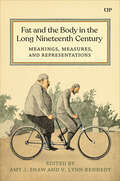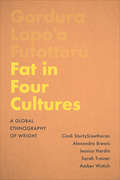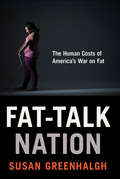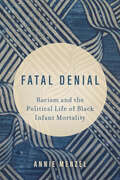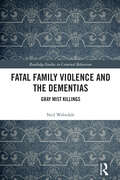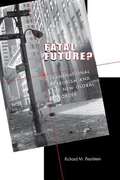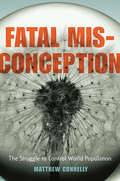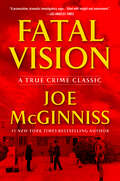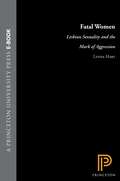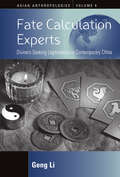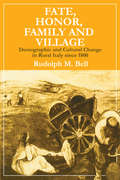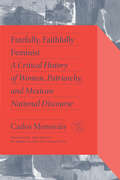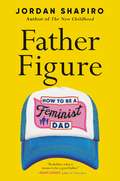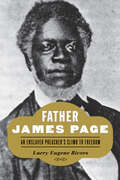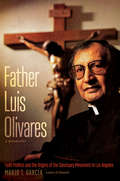- Table View
- List View
Fat and the Body in the Long Nineteenth Century: Meanings, Measures, and Representations
by V. Lynn Kennedy Amy J. ShawIn the nineteenth and early twentieth centuries, the body was a key focus of discourse. Fat and the Body in the Long Nineteenth Century animates discussion and analyses of fatness, highlighting how corporeal expectations fit into larger social systems and showing how interpretations have shifted over time. This collection examines a host of primary sources – including literature, art, medical treatises, journalism, political cartoons, soldiers’ letters home, and popular fiction – to identify trends in how fat was perceived and promoted in the English-speaking world over the long nineteenth century. Divided into four thematic sections, the book addresses epistemologies, artistic and literary representations, the turn towards quantification and measurement, and the connections to imperialism and colonialism. It explores the complex debate about the meaning of fat and its signalling of health, beauty, moral strength, and class status. The book shows how contemporary presentations and discussions of fat offer insights into ideals of gender and race and the processes of imperialism and of professionalization in the social sciences and medicine. By tracing how debates shifted over time, the book ultimately reveals that there was no universal interpretation of fat as a positive or negative characteristic throughout the nineteenth century.
Fat in Four Cultures: A Global Ethnography of Weight (Teaching Culture: UTP Ethnographies for the Classroom)
by Jessica Hardin Alexandra Brewis Amber Wutich Sarah Trainer Cindi SturtzSreetharanTraits that signal belonging dictate our daily routines, including how we eat, move, and connect to others. In recent years, "fat" has emerged as a shared anchor in defining who belongs and is valued versus who does not and is not. The stigma surrounding weight transcends many social, cultural, political, and economic divides. The concern over body image shapes not only how we see ourselves, but also how we talk, interact, and fit into our social networks, communities, and broader society. Fat in Four Cultures is a co-authored comparative ethnography that reveals the shared struggles and local distinctions of how people across the globe are coping with a bombardment of anti-fat messages. Highlighting important differences in how people experience "being fat," the cases in this book are based on fieldwork by five anthropologists working together simultaneously in four different sites across the globe: Japan, the United States, Paraguay, and Samoa. Through these cases, Fat in Four Cultures considers what insights can be gained through systematic, cross-cultural comparison. Written in an eye-opening and narrative-driven style, with clearly defined and consistently used key terms, this book effectively explores a series of fundamental questions about the present and future of fat and obesity.
Fat-Talk Nation: The Human Costs of America’s War on Fat
by Susan GreenhalghIn recent decades, America has been waging a veritable war on fat in which not just public health authorities, but every sector of society is engaged in constant "fat talk" aimed at educating, badgering, and ridiculing heavy people into shedding pounds. We hear a great deal about the dangers of fatness to the nation, but little about the dangers of today's epidemic of fat talk to individuals and society at large. The human trauma caused by the war on fat is disturbing--and it is virtually unknown. How do those who do not fit the "ideal" body type feel being the object of abuse, discrimination, and even revulsion? How do people feel being told they are a burden on the healthcare system for having a BMI outside what is deemed--with little solid scientific evidence--"healthy"? How do young people, already prone to self-doubt about their bodies, withstand the daily assault on their body type and sense of self-worth? In Fat-Talk Nation, Susan Greenhalgh tells the story of today's fight against excess pounds by giving young people, the campaign's main target, an opportunity to speak about experiences that have long lain hidden in silence and shame.Featuring forty-five autobiographical narratives of personal struggles with diet, weight, "bad BMIs," and eating disorders, Fat-Talk Nation shows how the war on fat has produced a generation of young people who are obsessed with their bodies and whose most fundamental sense of self comes from their size. It reveals that regardless of their weight, many people feel miserable about their bodies, and almost no one is able to lose weight and keep it off. Greenhalgh argues that attempts to rescue America from obesity-induced national decline are damaging the bodily and emotional health of young people and disrupting families and intimate relationships.Fatness today is not primarily about health, Greenhalgh asserts; more fundamentally, it is about morality and political inclusion/exclusion or citizenship. To unpack the complexity of fat politics today, Greenhalgh introduces a cluster of terms--biocitizen, biomyth, biopedagogy, bioabuse, biocop, and fat personhood--and shows how they work together to produce such deep investments in the attainment of the thin, fit body. These concepts, which constitute a theory of the workings of our biocitizenship culture, offer powerful tools for understanding how obesity has come to remake who we are as a nation, and how we might work to reverse course for the next generation.
Fatal Advice: How Safe-Sex Education Went Wrong
by Cindy PattonThe American public responded to the first cases of AIDS with fear and panic. Both policymakers and activists were concerned not only with stopping the spread of the disease, but also with guiding the public's response toward those already infected. Fatal Advice is an examination of how the nation attempted, with mixed results, to negotiate the fears and concerns brought on by the epidemic. A leading writer on the cultural politics of AIDS, Cindy Patton guides us through the thicket of mass-media productions, policy and public health enterprises, and activist projects as they sprang up to meet the challenge of the epidemic, shaping the nation's notion of what safe-sex is and who ought to know what about it.There is the official story, and then there is another, involving local groups and AIDS activists. Going back to early government and activist attempts to spread information, Patton traces a slow separation between official advice and that provided by those on the front lines in the battle against AIDS. She shows how American anxieties about teen sex played into the nation's inadequate education and protection of its young people, and chronicles the media's attempts to encourage compassion without broaching the touchy subject of sex or disrupting the notion that AIDS was a disease of social and sexual outcasts. Her overview of the relationship between shifting medical perceptions and safe-sex advice reveals why radical safe-sex educators eventually turned to sexually explicit, including pornographic, representations to spread their message--and why even these extreme tactics could not overcome the misguided national teaching on AIDS.Patton closes with a stirring manifesto, an urgent call to action for all those who do not want to see the hard lessons of AIDS education and activism wasted, or, with these lessons, the loss of so many more lives.
Fatal Charm: The Shocking True Story of Serial Wife Killer Randy Roth
by Carlton SmithFrom the bestselling author of The Search for the Green River Killer: A chilling true account of the dream husband who was every woman&’s nightmare. Randy Roth was handsome, hardworking, kind, and in top physical shape. But for all his charm and good looks, he was seemingly cursed with the ladies. His first marriage ended in divorce before the couple&’s fifth anniversary; his second wife plunged to her death during a hike; and his third wife left him after less than five months. But when Roth&’s fourth wife, Cynthia, drowned in an apparent speedboating accident in Washington State&’s Lake Sammamish just weeks after their first anniversary, a pattern of suspicious behavior finally caught up to him. As Roth set about collecting on a hefty insurance payout, the authorities were on to his game. Roth had been careful—and so close to getting away with it. But, as chronicled by Seattle Times reporter and Pulitzer Prize finalist Carlton Smith, his lies were about to come crashing down around him.
Fatal Denial: Racism and the Political Life of Black Infant Mortality (Reproductive Justice: A New Vision for the 21st Century #9)
by Annie MenzelFatal Denial argues that over the past 150 years, US health authorities’ explanations of and interventions into Black infant mortality have been characterized by the "biopolitics of racial innocence," a term describing the institutionalized mechanisms in health care and policy that have at once obscured, enabled, and perpetuated systemic infanticide by blaming Black mothers and communities themselves. Following Black feminist scholarship demonstrating that the commodification and theft of Black women’s reproductive bodies, labors, and care is foundational to US racial capitalism, Annie Menzel posits that the polity has made Black infants vulnerable to preventable death. Drawing on key Black political thought and praxis around infant mortality—from W.E.B. Du Bois and Mary Church Terrell to Black midwives and birth workers—this work also tracks continued refusals to acknowledge this routinized reproductive violence, illuminating both a rich history of care and the possibility of more transformative futures.
Fatal Family Violence and the Dementias: Gray Mist Killings (Routledge Studies in Criminal Behaviour)
by Neil WebsdaleThis book explores dementia-related aggression, violence, and homicide through a detailed analysis of “gray mist killings.” The term gray mist killing refers to intimate partner homicides (IPHs) committed by spouses/partners suffering from dementia, homicides of dementia sufferers committed by their caregiving spouses/partners or other family members, and IPHs attributable to the complications of caring for a co-resident family member suffering from dementia. Killings by people with dementia raise questions about the role of biological, psychological, and sociological forces. This book therefore encourages discussions around the relative weighting of these interrelated forces, and why the criminal justice system and the courts have a hard time handling these killings. It also adds to our understanding of the social responses to people with dementia, the orchestration of services, the nature of caring, and the interaction between sufferers and those familial, community, and state actors that provide support and care. The vividly detailed case studies (from the US, UK and Australia) uniquely inform criminological debates about violence, homicide, and the social responses to these complex phenomena. They are organized around the apparent motives for the killing, such as mercy, theft, prior intimate partner violence, mental illness, and exhaustion. The social responses of families, communities, and state actors are examined and contextualized against what researchers and dementia specialists suggest are promising or best practices for intervention. Apparent triggers or circumstantial precipitants for the killings invite discussion of signals, risks, and preventive interventions. The book culminates in an attempt to make sense of gray mist killings, as well as a discussion of broader implications and significance in relation to globalization, violence against women, the rising prevalence of the dementias, declining birthrates, climate change, and sustainable economic development. Drawing from a variety of disciplines, this book will be of great interest to students and scholars of criminology, sociology, psychology, psychiatry, anthropology, gender studies, social work, law, public policy, and gerontology. It should also appeal to judges, prosecutors, lawyers, social workers, gerontologists, law enforcement, adult protective services, physicians, psychologists, and psychiatrists.
Fatal Future?: Transnational Terrorism and the New Global Disorder
by Richard M. Pearlstein"As the media has zeroed in on the individual victims, heroes, and perpetrators of 9/11, followed the fighting in Afghanistan, and chronicled the 'war against terrorism' at home, there has been a crying need for a short, sober book like this one . . . to] provide a broader context. It shows that 9/11 was not unexpected, if unpredicted. " -- J. Garry Clifford, Professor of Political Science, University of Connecticut The nature and goals of terrorist organizations have changed profoundly since the Cold War standoff among the U. S. , Soviet, and Chinese superpowers gave way to the current "polyplex" global system, in which the old rules of international engagement have been shattered by a new struggle for power among established states, non-state actors, and emerging nations. In this confusing state of global disorder, terrorist organizations that are privately funded and highly flexible have become capable of carrying out incredibly destructive attacks anywhere in the world in support of a wide array of political, religious, and ethnic causes. This groundbreaking book examines the evolution of terrorism in the context of the new global disorder. Richard M. Pearlstein categorizes three generations of terrorist organizations and shows how each arose in response to the global conditions of its time. Focusing extensively on today's transnational (i. e. , privately funded and internationally operating) terrorist organizations, he devotes thorough attention to the two most virulent types: ethnoterrorism and radical Islamic terrorism. He also discusses the terrorist race for weapons of mass destruction and the types of attacks, including cyberterrorism, that are likely to occur incoming years. Pearlstein concludes with a thought-provoking assessment of the many efforts to combat transnational terrorism in the post-September 11 period.
Fatal Grievances: Forecasting and Preventing Active Killer Threats in School, Campus, and Workplace Settings
by Jeffrey A. Daniels Gregory M. Vecchi Mary Ann MarkeyActive killer attacks frequently dominate the headlines with stories of seemingly random mass killings in school, campus, and workplace settings. Nearly all of the attacks are over before the police can respond, leaving unanswered questions as to why these attacks happen and what can be done to prevent them. Fatal Grievances: Forecasting and Preventing Active Killer Threats in School, Campus, and Workplace Settings takes a proactive view of active killer threat management and resolution to prevent the attack before it occurs. Drawing from established threat assessment, behavioral analysis, and law enforcement negotiation theory and practice, the book presents models and methods designed to forecast and prevent an active killer attack through the process of identification, assessment, and engagement. This approach begins with definitions and orientations to violence, the importance of the primacy of focusing on direct behaviors of planned lethal violence over other more indirect behaviors, understanding how to identify a fatal grievance and that only fatal grievances result in planned lethal violence, the importance of understanding the process of crisis intervention as the key to eliminating the fatal grievance and the motivation to kill, and the use of time-series predictive behavioral threat forecasting methods to prevent an active killer attack. Case studies from within the United States (US) and abroad support this unique approach to threat assessment and make the concepts and principles accessible to professionals working in the fields of education, human resources, and security.
Fatal Invention: How Science, Politics, and Big Business Re-create Race in the Twenty-First Century
by Dorothy RobertsAn incisive, groundbreaking book that examines how a biological concept of race is a myth that promotes inequality in a supposedly &“post-racial&” era. Though the Human Genome Project proved that human beings are not naturally divided by race, the emerging fields of personalized medicine, reproductive technologies, genetic genealogy, and DNA databanks are attempting to resuscitate race as a biological category written in our genes. This groundbreaking book by legal scholar and social critic Dorothy Roberts examines how the myth of race as a biological concept—revived by purportedly cutting-edge science, race-specific drugs, genetic testing, and DNA databases—continues to undermine a just society and promote inequality in a supposedly &“post-racial&” era. Named one of the ten best black nonfiction books 2011 by AFRO.com, Fatal Invention offers a timely and &“provocative analysis&” (Nature) of race, science, and politics that &“is consistently lucid . . . alarming but not alarmist, controversial but evidential, impassioned but rational&” (Publishers Weekly, starred review). &“Everyone concerned about social justice in America should read this powerful book.&” —Anthony D. Romero, executive director, American Civil Liberties Union &“A terribly important book on how the &‘fatal invention&’ has terrifying effects in the post-genomic, &‘post-racial&’ era.&” —Eduardo Bonilla-Silva, professor of sociology, Duke University, and author of Racism Without Racists: Color-Blind Racism and the Persistence of Racial Inequality in the United States &“Fatal Invention is a triumph! Race has always been an ill-defined amalgam of medical and cultural bias, thinly overlaid with the trappings of contemporary scientific thought. And no one has peeled back the layers of assumption and deception as lucidly as Dorothy Roberts.&” —Harriet A. Washington, author of and Deadly Monopolies: The Shocking Corporate Takeover of Life Itself
Fatal Jealousy: The True Story of a Doomed Romance, a Singular Obsession, and a Quadruple Murder
by Colin McEvoy Lynn OlanoffThe shocking, true story of Pennsylvania mass murderer Michael Ballard who received the death sentence for his crimes—includes eight pages of dramatic photos.Out of controlJune 26, 2010. A Pennsylvania State Trooper, heading home from work, witnesses a car speeding and crashing into trees. Stopping to help, he finds that the driver, Michael Ballard, is alive—and drenched in blood. When asked what happened, the man answers: “I just killed everybody.”Out of his mindNot far from the accident, police make a gruesome discovery in the home of Michael’s ex-girlfriend, Denise Mehri. Four bodies are found, stabbed repeatedly with a knife: Denise on the kitchen floor; her grandfather, in his wheelchair; her neighbor, who tried to help; and her father, in a room with a blood-smeared obscenity painted on the wall. How could anyone do something so sinister?Out of time . . .Michael had already been convicted of murder when he was only eighteen. Despite several misconducts during his time in prison, he was found suitable for parole shortly after his minimum sentence lapsed. But this time, his deadly rampage would not be so easily pardoned. From authors Colin McEvoy and Lynn Olanoff, this is the shocking true story about four innocent people who fell prey to one man’sFatal jealousy.
Fatal Misconception: The Struggle to Control World Population
by Matthew ConnellyListen to a short interview with Matthew Connelly Host: Chris Gondek | Producer: Heron & Crane Fatal Misconception is the disturbing story of our quest to remake humanity by policing national borders and breeding better people. As the population of the world doubled once, and then again, well-meaning people concluded that only population control could preserve the "quality of life." This movement eventually spanned the globe and carried out a series of astonishing experiments, from banning Asian immigration to paying poor people to be sterilized. Supported by affluent countries, foundations, and non-governmental organizations, the population control movement experimented with ways to limit population growth. But it had to contend with the Catholic Church's ban on contraception and nationalist leaders who warned of "race suicide." The ensuing struggle caused untold suffering for those caught in the middle--particularly women and children. It culminated in the horrors of sterilization camps in India and the one-child policy in China. Matthew Connelly offers the first global history of a movement that changed how people regard their children and ultimately the face of humankind. It was the most ambitious social engineering project of the twentieth century, one that continues to alarm the global community. Though promoted as a way to lift people out of poverty--perhaps even to save the earth--family planning became a means to plan other people‘s families. With its transnational scope and exhaustive research into such archives as Planned Parenthood and the newly opened Vatican Secret Archives, Connelly's withering critique uncovers the cost inflicted by a humanitarian movement gone terribly awry and urges renewed commitment to the reproductive rights of all people.
Fatal Romance
by Lisa PulitzerNancy Richards was a young, beautiful speechwriter when she met Jeremy Akers, a decorated war hero and environmental lawyer. Nancy was immediately taken with the daredevil adventurer, and it wasn't long before their intense courtship led to a whirlwind marriage and children. Discovering she had a talent for penning historical romance novels, Nancy found fame as a bestselling author. But Nancy's life was far from the happily-ever-after romances she wrote... Nancy's friends alleged that behind the doors of the couple's home in one of Washington, D.C.'s most exclusive neighborhoods, she suffered repeated abuse at the hands of her husband. They also said that Nancy had told them Jeremy was resentful of her success and growing independence, and his beatings soon escalated into death threats. Torn between being forced to give up her kids and risking her life by remaining with Jeremy, Nancy moved into a one-bedroom basement apartment with a young male friend. After several pleas to visit the children, Nancy was finally allowed to take them on an outing. And just when she dared to hope that the worst was over, Jeremy shot her twice in the back of the head, killing her in front of their two youngest children. He then drove to the Vietnam War Memorial, where he killed himself with a shotgun.
Fatal System Error
by Joseph MennIn 2004, a California computer whiz named Barrett Lyon uncovered the identity of a hacker running major assaults on business websites. Without fully grasping the repercussions, he set on an investigation that led him into the heart of the Russian mob. Cybercrime was evolving. No longer the domain of small-time thieves, it had been discovered by sophisticated gangs. They began by attacking corporate websites but increasingly stole financial data from consumers and defense secrets from governments. While Barrett investigated the cutting edge of technology crime, the U. S. government struggled to catch up. Britain, however, was a different story. In the late 1990s, the Queen herself had declared safe e-commerce a national security priority. Agents from the London-based National Hi-Tech Crime Unit sought out Barrett and enlisted his help. They also sent detective Andrew Crocker, a Welsh former boxer, to Russia to track down and prosecute the hackers--and to find out who they worked for. "Fatal System Error "penetrates both the Russian cyber-mob and the American mafia as the two fight over the Internet's massive spoils. It takes readers into the murky hacker underground, traveling the globe from San Francisco to Costa Rica, London, and Russia. Using unprecedented access to mob businesses and Russian officials, it shows how top criminals earned protection from the Russian government--and how Barrett Lyon and Andrew Crocker got closer to the titans of the underground economy than any previous outsider. Together, their stories explain why cybercrime is much worse than you thought--and why the Internet might not survive.
Fatal Violence: Case Studies and Analysis of Emerging Forms
by Ronald M. Holmes Stephen T. HolmesFrom serial murderers to parents who kill, Fatal Violence: Case Studies and Analysis of Emerging Forms provides an insider‘s look at a phenomenon that has existed since the dawn of man and cuts across social/economic barriers and cultures. Offering a rare glimpse into the minds of predators and containing chilling details of motives and methods, th
Fatal Vision: A True Crime Classic (Vib Ser.)
by Joe McGinnissThe electrifying true crime story of Dr. Jeffrey MacDonald, the handsome, Princeton-educated physician convicted of savagely slaying his young pregnant wife and two small children—murders he vehemently denies committing....&“Chilling. . . . A haunting resurrection of Crime and Punishment.&”—TimeBestselling author Joe McGinniss chronicles every aspect of this horrifying and intricate crime and probes the life and psyche of the magnetic, all-American Jeffrey MacDonald—a golden boy who seemed destined to have it all. The result is a penetration to the heart of darkness that enshrouded one of the most complex criminal cases ever to capture the attention of the American public. It is a haunting, stunningly suspenseful work that no reader will be able to forget.Includes a Special Epilogue by the authorOVER ONE MILLION COPIES SOLD
Fatal Women: Lesbian Sexuality and the Mark of Aggression
by Lynda HartA groundbreaking and provocative look at how violent women have been represented in literature, plays, film, and performanceFatal Women builds a complex and original theory of how the shadow of the lesbian animates representations of violent women, from the Victorian novel to films depicting women who kill. Starting from the historical link between criminality and sexual deviancy, Lynda Hart critiques constructions of gender, race, class, sexualities, and the cultural politics of the 1990s. Her introductory chapter constructs a theory of female violence across the discourses of sexology, criminology, and psychoanalysis. Subsequent chapters detail this theory in the Victorian novel and stage sensation Lady Audley&’s Secret; Frank Wedekind&’s Lulu Plays, which introduced the &“invert&” to the European stage; the films Thelma and Louise, Mortal Thoughts, and Basic Instinct; the political intersection of race and gender in Single White Female; the performance art of Karen Finley in the context of the censorship debates; the fate of Aileen Wuornos, dubbed the first &“female serial killer&” by the FBI; and the Split Britches&’ performance Lesbians Who Kill.A major contribution to lesbian theory and cultural studies, Fatal Women is certain to be read widely by scholars, students, and anyone interested in the politics of representation.
Fatalism and Development: Nepal's Struggle for Modernization
by Dor Bahadur BistaDor Bahadur Bista, being a Nepali, recounts all the events of the country's struggle to modernize from being a monarchy.
Fate Calculation Experts: Diviners Seeking Legitimation in Contemporary China (Asian Anthropologies #9)
by Geng LiHaving long been stigmatized as an immoral and even illegal “superstition”, the popular practice of divination is experiencing a revival in contemporary China. Fate Calculation Experts explores how diviners attempt to achieve legitimation in a society which identifies strongly with modernity, science, and rationality. As well as associating with modern knowledge production systems, diviners build a positive social image for their occupation via claims to moral authority and appeals to “tradition”. Beyond matters of image management, diviners’ efforts towards legitimation also figure in the social relationships and fundamental cultural values they develop in their practice.
Fate, Honor, Family and Village: Demographic and Cultural Change in Rural Italy Since 1800
by Rudolph M. BellThe Italian peasantry has often been described as tragic, backward, hopeless, downtrodden, static, and passive. In Fate and Honor, Family and Village, Rudolph Bell argues against this characterization by reconstructing the complete demographic history of four country villages since 1800. He analyzes births, marriages, and deaths in terms of four concepts that capture more accurately and sympathetically the essence of the Italian peasant's life: Fortuna (fate), onore (honor, dignity), famiglia (family), and campanilismo (village).Fortuna is the cultural wellspring of Italian peasant society, the worldview from which all social life flows. The concept of Fortuna does not refer to philosophical questions, predestination, or value judgments. Rather, Fortuna is the sum total of all explanations of outcomes perceived to be beyond human control. Thus, in Bell's view, high mortality does not lead peasants to a resigned acceptance of their fate; instead, they rely on honor, reciprocal exchanges of favors, and marriage to forge new links in their familial and social networks. With thorough documentation in graphs and tables, the author evaluates peasant reactions to time, work, family, space, migration, and protest to portray rural Italians as active, flexible, and shrewd, participating fully in shaping their destinies.Bell asserts that the real problem of the Mezzogiorno is not one of resistance to technology, of high birth rates, or even of illiteracy. It is one of solving technical questions in ways that foster dependency. The historical and sociological practice of treating peasant culture as backward, secondary, and circumscribed only encourages disruption and ultimately blocks the road to economic and political justice in a post-modern world.
Fatefully, Faithfully Feminist: A Critical History of Women, Patriarchy, and Mexican National Discourse (Critical Mexican Studies)
by Carlos MonsiváisThis critical anthology of writings by Carlos Monsiváis represents a foundational set of texts by an exceptional (yet under‑translated) Mexican cultural critic. Fatefully, Faithfully Feminist situates the urgencies of social movements as they developed in real time. Spanning from 1973 to 2008, Monsiváis&’s essays, which were originally compiled by scholar Marta Lamas, analyze the role of women in a patriarchal culture from pre‑Columbian times to the present. This critical edition offers extensive annotation and cultural background to understand the cogent, but particularly Mexican arguments that Monsiváis makes, many of which are extremely relevant in today&’s political economy in the US and the world. Norma Klahn and Ilana Luna&’s translation, critical introduction, and commentary consider issues of context, history, and conventions, framing Monsiváis&’s debates in relation to global feminist history and human rights struggles.
Father Figure: How to Be a Feminist Dad
by Jordan ShapiroA thoughtful and long-overdue exploration of fatherhood and masculinity in the 21st century that "redefines what it means to be a good father" (Adam Grant).There are hundreds of books on parenting, and with good reason—becoming a parent is scary, difficult, and life-changing. But when it comes to books about parenting identity, rather than the nuts and bolts of raising children, nearly all are about what it's like to be a mother.Drawing on research in sociology, economics, philosophy, gender studies, and the author's own experiences, Father Figure sets out to fill that gap. It's an exploration of the psychology of fatherhood from an archetypal perspective as well as a cultural history that challenges familiar assumptions about the origins of so-called traditional parenting roles. What paradoxes and contradictions are inherent in our common understanding of dads? Might it be time to rethink some aspects of fatherhood?Gender norms are changing, and old economic models are facing disruption. As a result, parenthood and family life are undergoing an existential transformation. And yet, the narratives and images of dads available to us are wholly inadequate for this transition. Victorian and Industrial Age tropes about fathers not only dominate the media, but also contour most people's lived experience. Father Figure offers a badly needed update to our collective understanding of fatherhood—and masculinity in general. It teaches dads how to embrace the joys of fathering while guiding them toward an image of manliness for the modern world.
Father James Page: An Enslaved Preacher's Climb to Freedom
by Larry Eugene RiversThis first-of-its-kind biography tells the story of Rev. James Page, who rose from slavery in the nineteenth century to become a religious and political leader among African Americans as well as an international spokesperson for the cause of racial equality.James Page spent the majority of his life enslaved—during which time he experienced the death of his free father, witnessed his mother and brother being sold on the auction block, and was forcibly moved 700 miles south from Richmond, VA, to Tallahassee, FL, by his enslaver, John Parkhill. Page would go on to become Parkhill's chief aide on his plantation and, unusually, a religious leader who was widely respected by enslaved men and women as well as by white clergy, educators, and politicians. Rare for enslaved people at the time, Page was literate—and left behind ten letters that focused on his philosophy as an enslaved preacher and, later, as a free minister, educator, politician, and social justice advocate. In Father James Page, Larry Eugene Rivers presents Page as a complex, conflicted man: neither a nonthreatening, accommodationist mouthpiece for white supremacy nor a calculating schemer fomenting rebellion. Rivers emphasizes Page's agency in pursuing a religious vocation, in seeking to exhibit "manliness" in the face of chattel slavery, and in pushing back against the overwhelming power of his enslaver. Post-emancipation, Page continued to preach and to advocate for black self-determination and independence through black land ownership, political participation, and business ownership. The church he founded—Bethel Missionary Baptist Church in Tallahassee—would go on to be a major political force not only during Reconstruction but through today. Based upon numerous archival sources and personal papers, as well as an in-depth interview of James Page and a reflection on his life by a contemporary, this deeply researched book brings to light a fascinating life filled with contradictions concerning gender, education, and the social interaction between the races. Rivers' biography of Page is an important addition, and corrective, to our understanding of black spirituality and religion, political organizing, and civic engagement.
Father Luis Olivares, A Biography: Faith Politics And The Origins Of The Sanctuary Movement In Los Angeles
by Mario T. GarcíaThis is the amazing untold story of the Los Angeles sanctuary movement's champion, Father Luis Olivares (1934-1993), a Catholic priest and a charismatic, faith-driven leader for social justice. Beginning in 1980 and continuing for most of the decade, hundreds of thousands of Salvadoran and Guatemalan refugees made the hazardous journey to the United States, seeking asylum from political repression and violence in their home states. Instead of being welcomed by the "country of immigrants," they were rebuffed by the Reagan administration, which supported the governments from which they fled. To counter this policy, a powerful sanctuary movement rose up to provide safe havens in churches and synagogues for thousands of Central American refugees. Based on previously unexplored archives and over ninety oral histories, this compelling biography traces the life of a complex and constantly evolving individual, from Olivares's humble beginnings in San Antonio, Texas, to his close friendship with legendary civil rights leader Cesar Chavez and his historic leadership of the United Neighborhoods Organization and the sanctuary movement.
Father Luis Olivares, a Biography: Faith Politics and the Origins of the Sanctuary Movement in Los Angeles
by Mario T. GarcíaThis is the amazing untold story of the Los Angeles sanctuary movement's champion, Father Luis Olivares (1934–1993), a Catholic priest and a charismatic, faith-driven leader for social justice. Beginning in 1980 and continuing for most of the decade, hundreds of thousands of Salvadoran and Guatemalan refugees made the hazardous journey to the United States, seeking asylum from political repression and violence in their home states. Instead of being welcomed by the "country of immigrants," they were rebuffed by the Reagan administration, which supported the governments from which they fled. To counter this policy, a powerful sanctuary movement rose up to provide safe havens in churches and synagogues for thousands of Central American refugees.Based on previously unexplored archives and over ninety oral histories, this compelling biography traces the life of a complex and constantly evolving individual, from Olivares's humble beginnings in San Antonio, Texas, to his close friendship with legendary civil rights leader Cesar Chavez and his historic leadership of the United Neighborhoods Organization and the sanctuary movement.
